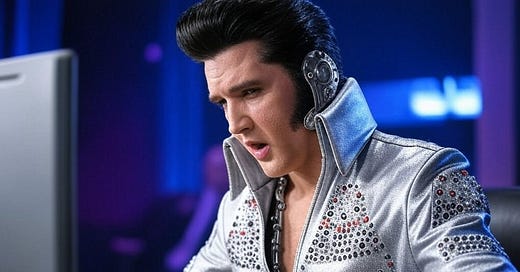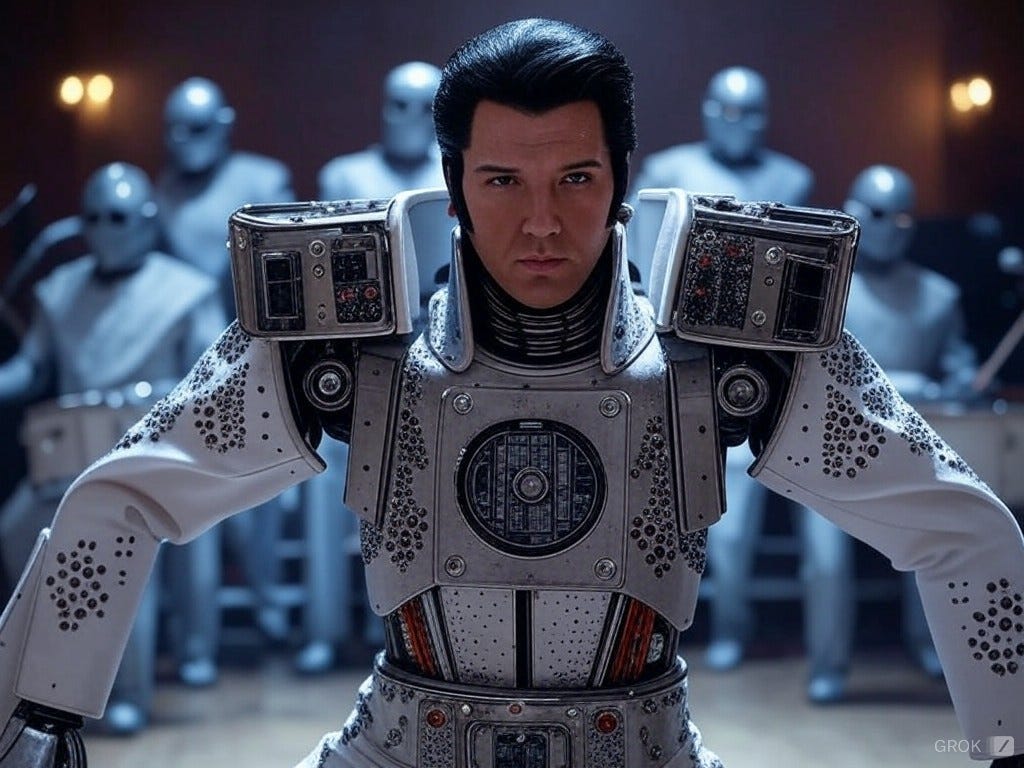One time in 1998 while driving cross-country from California to Virginia for a new job and new home and to try to get into UVA Law School, I was passing through Memphis and into my mind popped, “GRACELAND.” I was far from the “Green Green Grass of Home”
Dear children, this was a different era before digital GoogleMaps mapping software on your phone (or in your car), or if you had a smart phone — really!
I actually had a “book map,” a national map with pages and it had individual pages for each major metro. Memphis it was.
It was on the seat next to me in my BMW 325i Turbo. I was trying to read it and navigate and drive at the same time, and distracted, and too late noticed the flashing blue and red lights behind me. (I was swerving a little) I don’t think I was “In The Ghetto.”
Embarrassed and scared at being pulled over in Memphis, the officer could not have been kinder.
“Sir, where are you headed?”
“Graceland. I’m passing through to Virginia and wanted to stop and see Elvis.”
“Follow me.”
He got back in his car and, amazingly, left his lights on and drove ahead of me.
So I followed behind him.
We drove through the streets of Memphis with a police escort with lights blazing!
He even did the “beep beep” at two intersections (where we had a red light!) and I trepidaciously followed “running a red.” But I had an escort so figured it was ok.
Arriving at Graceland he pointed then saluted. It was an amazing entry to the Home of “The King” Elvis Presley that I never could have imagined. It was like a dream.
This past July, Tennessee passed the “ELVIS” Act. It’s not really about Elvis and yet it is. And it’s also about you and me and AI.
Tennessee ELVIS Act (Ensuring Likeness, Voice, and Image Security Act of 2024)
Public chapter (No. 588) of the State of Tennessee, specifically House Bill No. 2091
Amends the Tennessee Code Annotated to enhance the protection of personal rights, particularly concerning the use of an individual's name, photograph, voice, or likeness.
Key points of the act include:
Renaming the "Personal Rights Protection Act of 1984" to the "Ensuring Likeness, Voice, and Image Security Act of 2024" (ELVIS)
Expanding the definition of "person" to include individuals
Adding a definition for "voice" as a sound in any medium that is identifiable and attributable to a particular individual
Establishing that every individual has a property right in the use of their name, photograph, voice, or likeness in any medium and manner
Extending protection to commercial exploitation rights for up to 10 years after an individual's death, with a possible termination after 2 years of non-use
Introducing liability for unauthorized use, publication, or distribution of an individual's name, photograph, voice, or likeness
Creating liability for distributing technology primarily designed to produce an individual's photograph, voice, or likeness without authorization 6.
Allowing for enforcement of rights by individuals or their contractual representatives in certain cases
Defining fair use exceptions, including news reporting, criticism, parody, and incidental use
Updating the knowledge requirement for unauthorized use to include what a person "reasonably should have known"
This Tennessee legislation is ground-breaking with respect to copyright, personal rights, persona and individual human rights — and is immediately relevant legally to our ai + law epoch.
Significantly expanding the scope of personal rights protection in Tennessee, particularly in the digital age where voice and image manipulation technologies are becoming more prevalent with AI expanding, I predict this is a “leading type” of law (just like my leading type of law enforcement officer friend).
As I have written about here and recorded (“digital twins” and the “digital You”) AI will Hoover vaccum all data and this could include your words, voice, look, even gait, voice patterns, gestures and mannerisms….
To whom do AI-generated digital human forms belong (or the digital “artefacts” of particular humans)?
Should any or all LLMs be able to copy you? Think of OAI entry with voice this past May and the synthetic Scarlett Johanssen voice.
What if they made a “digital clone” of you, words, voice, or ideas? What if it were for pornography? What if they made a lot of money by selling a twin of your persona. Don’t want to leave you in the “Heartbreak Hotel.”
AI is bringing to the fore whole new legal and technological questions touching on the rights of the human person that you and I enjoy daily in our uniqueness, and have never before been challenged in these varieties of ways?
You may have never thought of it, yet it is “Always on My Mind.”
Are you “All Shook Up”?
Will the LLMs “Love Me Tender”?
“I Beg of You” I recommend we all get to work securing our own digital rights to…………..ourselves. “I Want to Be Free”
“All That I Am”
Often in law the best way to protect intellectual property is by fixing in the form of a product or a tool — then it becomes tangiable, recordable, commercial or at least potentially. “Clean Up Your Own Backyard” Don’t be “The Fool”
“I Believe” you can bet others are doing this to strangers unawares. Will they “make a digital you”? Will you make a digital you?
“It’s Now or Never”
“Any Day Now”
“Don’t Ask Me Why”
“Have I Told You Lately That I Love You?”
* Images courtesy of the brand new, hyper cool and good, xAI Grok Aurora tool. You’ve got to check it out on X and please follow me @aicounseldallas








Very cool post, Cyrus. Here you go breaking all the rules it seems so easy. The ELVIS Act and AI. Who would’a thunk it